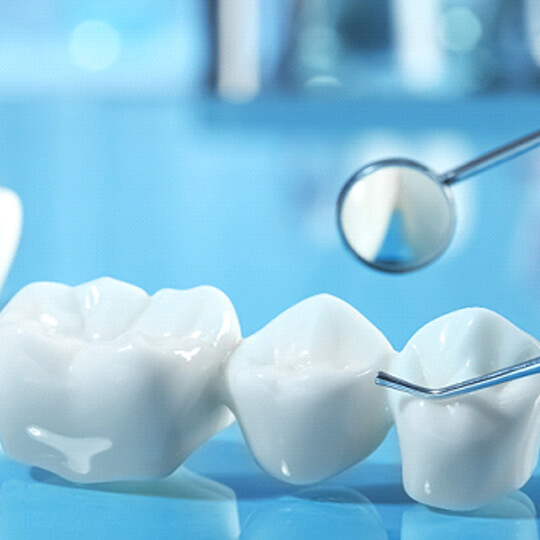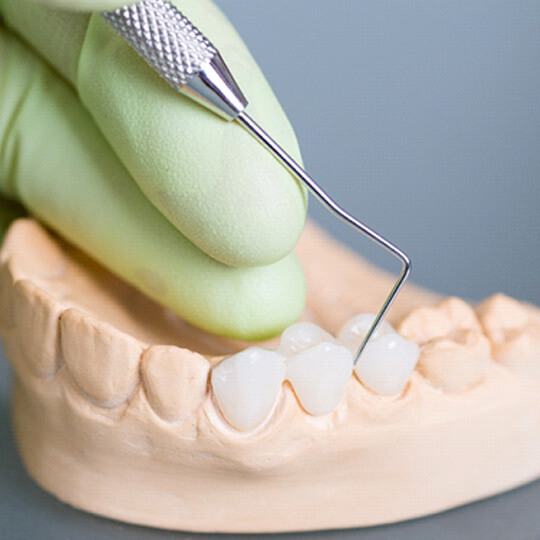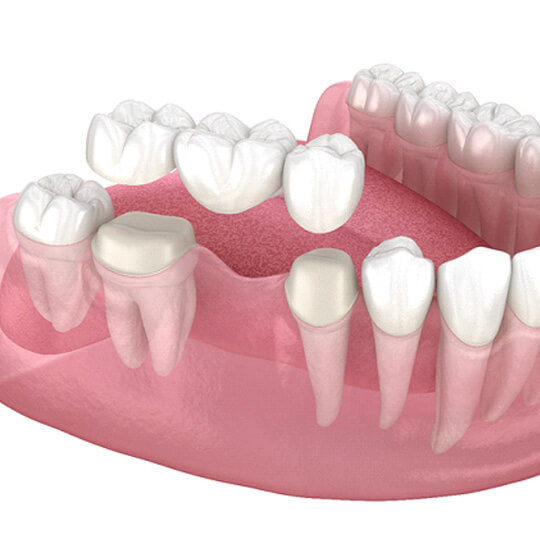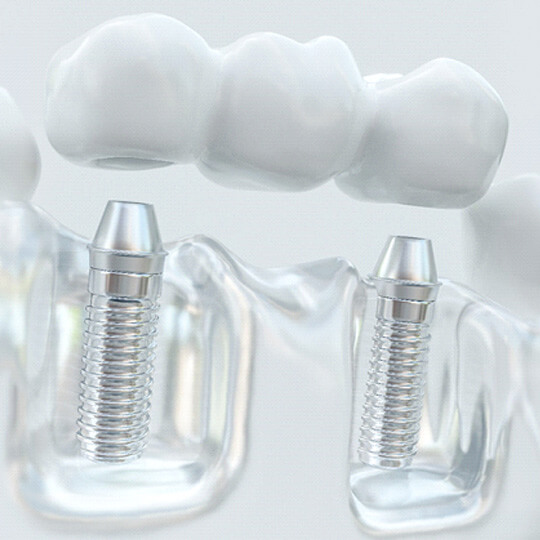Dental Bridges – Dallas, TX
Helping Your Teeth Make Connections
Missing even a single tooth can seriously hinder your ability to talk and eat, in addition to the impact that it can have on your appearance. Even missing just one of your back teeth can change the structure of your face and may make it substantially harder to prepare the food you eat for digestion.
If you live near Dallas, a dental bridge from Soleil Dental can help your teeth make connections, restoring your smile to complete perfection. Give us a call today and we’ll let you know about how this can happen for you.

Why Choose Soleil Dental For Dental Bridges?
- Bilingual Dental Team Who Can Listen to your Needs
- Advanced Imaging Technology for Beautiful, Realistic Restorations
- Comfortable Office that Makes Treatment a Pleasure
What is a Dental Bridge?

Generally speaking, a dental bridge consists of one or more false teeth sandwiched two of your natural teeth. How it’s attached varies depending on the variety of bridge that you’re getting, but each variety is designed to effectively replace a few of your teeth either a ceramic simulation. This means that bridges are usually recommended for patients missing a few teeth right next to each other.
Types of Dental Bridges

There are two main types of dental bridges: traditional and implant. We’ll be able to tell you more about what kind is ideal for you when we meet you in person. Until then, here’s what you should know about the variety of dental bridges available to you.
Traditional Dental Bridges

Traditional dental bridges secure in place via two dental crowns, small “caps” that can be placed on top of the existing teeth. Both the crowns and the false teeth will appear incredibly realistic, and can be completed without any kind of surgery.
Implant Bridges

Implant bridges are dental bridges connected to dental implants. A row of false teeth are attached to two or more metal posts that are surgically implanted into the jaw. This provides them with a remarkable amount of durability, and unlike traditional dental bridges you won’t have to make alterations to any of your natural teeth.
The Benefits of Getting a Dental Bridge

Neglecting to replace a missing tooth can cause all kinds of problems. Your teeth are valuable tools for grinding up your food effectively and preparing them for digestion, and missing even one can impair your ability to get all the nutrients possible from your food. It’s also possible that if you leave a gap in your smile other teeth will rush to fill it, creating a misalignment.
Replacing your teeth with a dental bridge affords you greater bite strength, increased confidence, and saves you from potential oral health problems down the line.
Dental Bridges FAQs
Dental bridges in Dallas are a trusted solution for treating consecutive tooth loss. They've been used for generations because of their success and durability. However, it's a big investment. Don't worry because your dentist at Soleil Dental will explain exactly what you can expect each step of the way during your consultation. In the meantime, you can contact our office to speak with a member of our team. You can also find the answers to the most frequently asked questions about dental bridges below.
Can You Take a Dental Bridge Out?
A dental bridge is designed to provide long-lasting results. It is held in place by bonding dental crowns to the adjacent teeth. Therefore, only a dentist in Dallas can take it out, like when meeting a replacement. If you prefer a removable option, ask your dentist about the benefits of a partial denture.
How Many Teeth Can a Dental Bridge Replace?
A fixed bridge can replace one or more lost teeth in a row. However, longer restorations may not be as stable and can put too much strain on the abundant teeth. Therefore, most dentists recommend only treating 1-3 missing teeth with a dental bridge. If you have several teeth you'd like to replace, an implant bridge might be the better option. 1-2 implant posts are surgically placed into your jawbone to serve as new tooth roots to support your bridge. You won't have to alter healthy teeth, and you'll benefit from unmatched stability using a method that can last for decades with the correct care, like brushing and flossing.
How Long Will a Dental Bridge Last?
The average lifespan of a traditional dental bridge is about 5 to 15 years. Many factors affect the duration of your results, like your oral hygiene. You can ensure your restoration lasts by brushing your teeth at least twice a day for 2 minutes and flossing every night. Moderate your consumption of hard or chewy foods to avoid unnecessary wear and tear on your restoration. Break any bad habits that may damage your teeth or bridge, like crunching ice or chewing on your fingernails. If you have a habit of grinding or clenching your teeth, ask your dentist for a nightguard. It will provide a protective barrier between your upper and lower teeth to prevent damage. Don't forget to schedule a cleaning and checkup with your dentist every 6 months. They'll keep your mouth healthy to ensure your investment lasts its longest while helping you avoid additional tooth loss.
Can I Use My Dental Insurance for a Bridge?
Every dental insurance plan differs, but you might be able to use your coverage for your initial consultation, diagnostic services, and imaging. If you require any preliminary procedures, like gum disease therapy or tooth extractions, your insurance may cover some of the expenses. Dental insurance may pay 50% to 80% of the costs after meeting your annual deductible. We will help you maximize your yearly allowance to reduce the amount you'll pay out-of-pocket. Our office accepts various financial solutions to keep a complete smile within your budget, like monthly payments through CareCredit.
I Need a Checkup & Cleaning I Need a Dentist for My Child I am Concerned About Bleeding Gums I am Missing One or More Teeth I Want to Enhance My Smile I Want a Straighter Smile I am Scared of the Dentist I am in Pain & Need Help I Need My Wisdom Teeth Removed I Have Pain in My Jaw View Our Services
